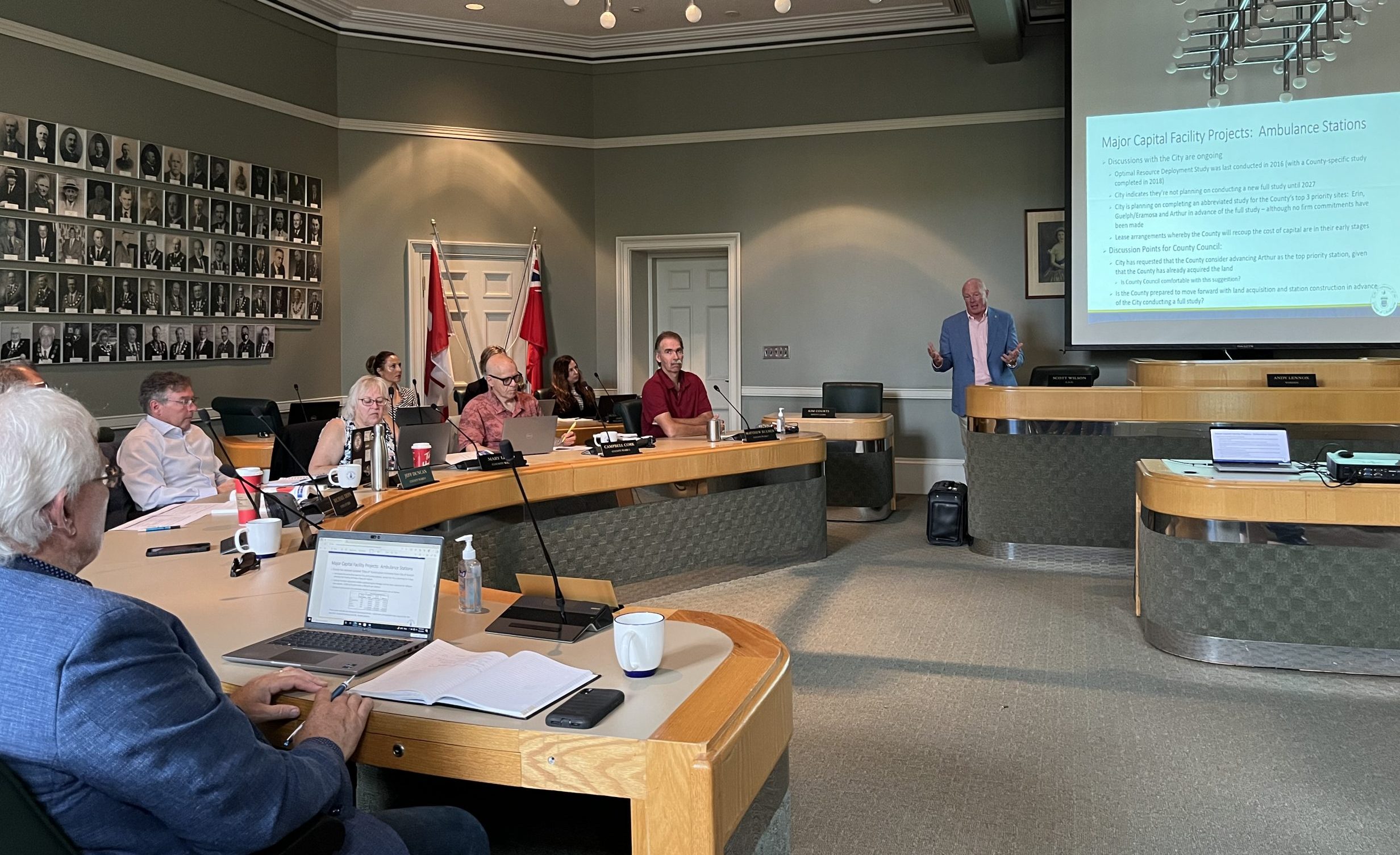GUELPH – Residents of Wellington County may want to brace themselves for an above-normal tax increase next year.
The county budget is under more pressure than previously understood, councillors learned during a three-hour meeting on Oct. 5, during which county treasurer Ken DeHart presented an updated budget outlook.
Finance committee chair Chris White and Warden Andy Lennox asked for the update at the end of July, when council approved $31 million to be spent on three capital projects running over budget by 40 to 83 per cent.
In addition to hashing out the county’s budget each year for capital projects (such as buildings and roads) and the operating budget (for services such as policing and social housing), treasury staff also dust off their crystal ball and peer a decade into the future.
The practice allows the current council to plan for anticipated projects and expenses that future councils will deal with.
This time around, the look into the near future revealed what one councillor called “pricing hell.”
“The predominate discussion is on construction prices,” DeHart told councillors last week, speaking to a high-level overview of major capital projects, including ambulance stations and county roads garages estimated to cost nearly $120 million over the next decade.
DeHart cast a large part of the blame for ballooning capital costs on compounding, double-digit increases to the construction price index since 2022 – a measure of change in the cost of constructing buildings over time.
Historical yearly increases to the index would typically be around 3.5%. There was an average increase last year of 15%, according to Statistics Canada data.
Starting next year, the county has vague plans to construct new ambulance stations every two years in Erin, Guelph/Eramosa, Wellington North and Mapleton through to 2032.
Last year’s budget put the cost at $11.68 million for five stations, however cost estimates have since increased by 290% to $45.55 million — a difference of $33.87 million from last year’s estimate.
Part of the reason for the jump, council heard, is updated station designs showing footprints of 5,700 square feet, an increase from the 3,200 square feet originally planned. The difference in cost for each station ranges between $5.43 and $8.13 million – and that’s for construction only.
A 2018 study, relying on 2016 data, suggested stations in Erin, Mount Forest and Guelph/Eramosa be relocated to shorten response times. That means the county would also need to purchase land; a cost not considered in estimates provided to council last week.
Though the City of Guelph provides emergency medical services to the county, the county would have to put all the money up front to build the stations and recoup the cost over more than two decades by leasing the buildings to the city. Something similar was done with the Rockwood OPP detachment over a 15-year period.
Councillors questioned whether stations need to be moved as well as the expanded square footage and if new stations are needed at all.
To answer those questions, the county contends an updated study is needed. But the city doesn’t want to pay for one until 2027.
“I’m not sure that things are as dire as they (the city) try to make them look, in terms of the condition of those [stations] … I don’t get the sense from them that they’re actually in a rush to do anything,” councillor Matthew Bulmer remarked.
“We need an updated study, that’s the bottom line here,” councillor Chris White said.
After nearly an hour of discussion, the consensus around the horseshoe was to hold off on making decisions about new stations until council has an updated study in hand.
The total cost estimate for four new county roads garages has risen 122% to $74.15 million, from $33.33 million – a difference of $40.81 million since last year’s outlook.
Part of the reason for the increase is tied to a roads committee decision against combining Erin and Brucedale garages into a single building.
The Brucedale garage is working on its 66th year, and the Erin location doesn’t have enough room for equipment.
Councillor James Seeley explained the decision not to combine was based largely on road crew response times. He said the cost of the committee’s decision is “a tough one to look at.”
Continuing, DeHart said “[A] $40-million increase is going to be difficult to account for.”
The county would need to take on more debt to build the garages on the current schedule, DeHart said.
Council has already approved $5.8 million of debt, to cover what reserves couldn’t, for a future library in Erin and a county roads garage in Arthur.
Council voiced support for seeing what the financials look like if building the garages is spread out over more time.
Major operating budget impacts include housing services, rising insurance premiums, staffing the county’s long-term care facility, benefits for part-time staff, and maintaining buildings.
DeHart explained there’s an estimated increase of $5.3 million in 2024 to address housing and homelessness, though Guelph taxpayers will take on most of that burden, at $4.6 million, with county taxpayers covering $700,000.
Unknowns remain around cost impacts from Bill 23, an anticipated reduction in Ontario Works funding as related employment services become privatized next year, and the positive effect of increased revenue from a growing tax base.
“All of these items will have an impact on the county budget going forward,” DeHart told council.
Residents can live with tax increases, councillor Doug Breen said.
“What they will not live with is any indication that we’re going above and beyond what’s necessary,” he said, adding the “era of nice-to-haves” is over.
“Generally speaking, although we have no numbers right yet, you can anticipate that the property tax increase will be higher than historical norms,” DeHart said, adding staff will aim to stay in line with inflation.
Between now and when council reviews a final budget in January, draft versions will be reviewed by senior staff, department heads and at the county committee level.




